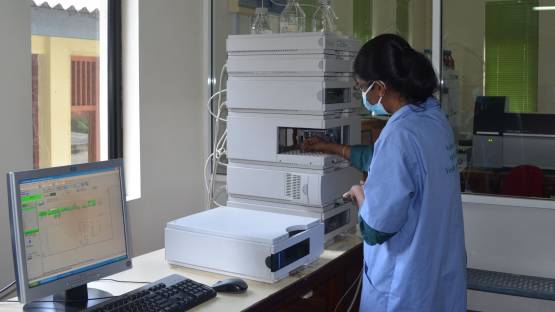Contaminated food is a threat to public health around the world, leading to illness and disease that affect animals and people. While some threats are visible to the human eye, like mold invading groundnuts or fruits, others may go unnoticed, unbeknownst to consumers. Almost 1 in 10 people in the world fall ill after eating contaminated food and 420 000 die every year, according to the World Health Organization (WHO).
Supply chains cross multiple borders and oceans, and the active presence of food safety laboratories stand guard to weed out inauthentic and contaminated food products worldwide. The IAEA, in partnership with the Food and Agriculture Organization of the United Nations (FAO), has been supporting laboratories to ensure competence in staff and technological capacity to meet international standards and attain accreditation. In Sri Lanka, IAEA assistance in developing testing capability at the Food Safety and Quality Assurance Laboratory (FSQAL) has played a pivotal role in protecting consumers, particularly from contaminated coconut oil.
“There is an issue of aflatoxin contamination in coconut oil in Sri Lanka, and FSQAL is recognized by many experts as the most reliable testing laboratory in the country,” said Ruchika Fernando, Technical Manager/Senior Lecturer at FSQAL at the University of Peradeniya in Sri Lanka. Aflatoxins thrive in warm and humid regions and are produced by certain fungi found on crops, such as corn, cereals and peanuts. Long term exposure to aflatoxin can affect the immune system and normal development, or cause cancer, according to WHO.
The FSQAL in Peradeniya was initiated in 2001, under the IAEA technical cooperation programme, to implement screening and confirmatory methodologies using nuclear techniques for the surveillance of residues. Through expert missions, fellowships and scientific visits, laboratory staff were trained in the application of the nuclear and related analytical methods and in quality assurance, including preparation of standard operating procedures and associated documentation. The laboratory’s capabilities have expanded since then, through further participation in coordinated research projects, technical cooperation projects and training by the Joint FAO/IAEA Centre of Nuclear Techniques in Food and Agriculture.
“Having started from scratch, FSQAL continues to nurture its acquired technical potential and expand services in food safety testing,” said Mykola Kurylchyk, IAEA Programme Management Officer for Sri Lanka.
Given regulatory requirements for both international and local markets, food products free of harmful chemical contaminants and food-borne pathogens have become mandatory. “Due to our research and surveillance in the recent past, Sri Lanka’s Health Ministry and Department of Animal Production and Health worked on establishing aflatoxin regulations for food and feed," Fernando said.
In December 2019, the Sri Lanka Accreditation Board accredited FSQAL for chemical testing in food and agricultural products based on ISO/IEC 17025. “The current capabilities of the laboratory and the recognition it is getting for the vital role it plays in maintaining food safety standards in Sri Lanka are testament to the dedication and focus of the FSQAL team through the many interactions with IAEA and the Joint FAO/IAEA Centre over the years,” said Andrew Cannavan, Head of the Food and Environmental Protection Laboratory at the Joint FAO/IAEA Centre.
Read more about the IAEA and FAO’s joint work to ensure food safety and quality.







